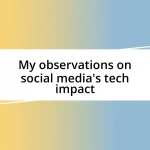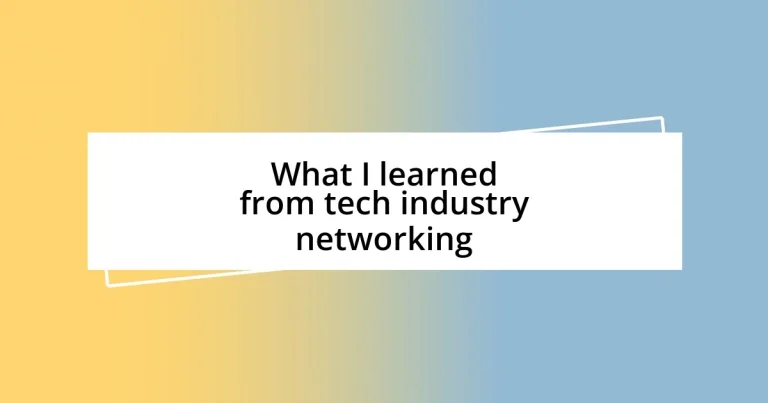Key takeaways:
- Networking is vital for career growth in tech, facilitating skill enrichment and professional connections through meaningful conversations and follow-ups.
- Building authentic relationships involves sharing personal experiences and maintaining ongoing communication, which strengthens trust and collaboration.
- Utilizing social media and joining industry-specific groups enhances networking efforts, leading to unexpected opportunities and a supportive community.
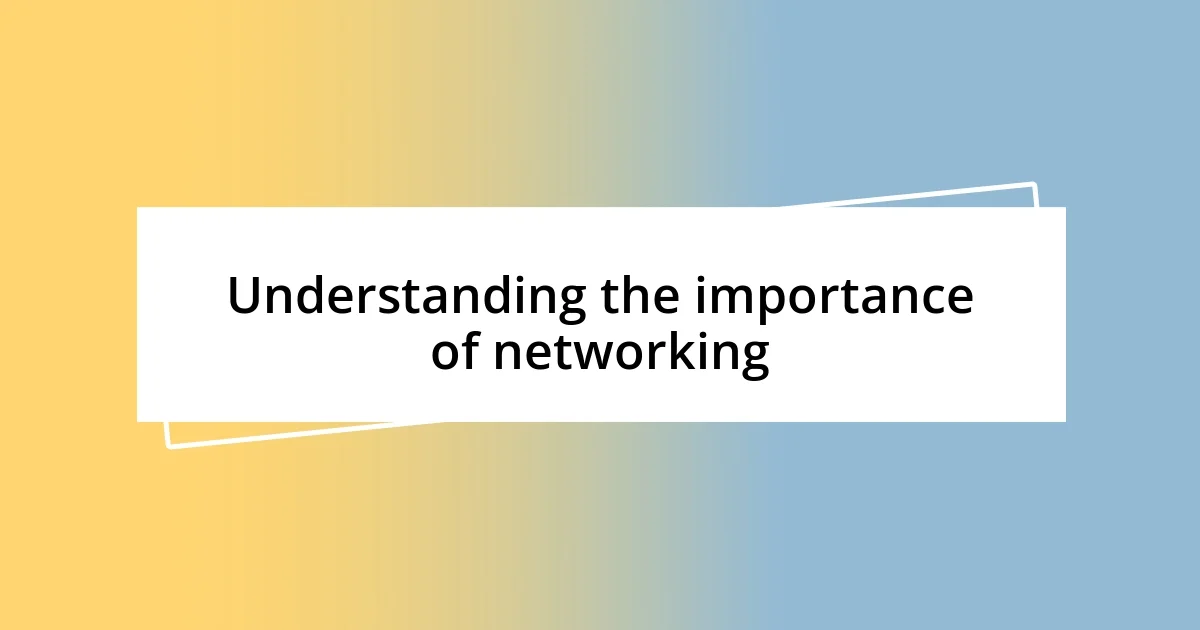
Understanding the importance of networking
Networking is essential in the tech industry, not just for finding job opportunities but also for building long-lasting relationships. I remember attending a local tech meetup where I struck up a conversation with a software engineer. That simple chat led to collaborative projects that enriched my skills and expanded my professional circle. Isn’t it fascinating how one interaction can change your career trajectory?
Think about it: who you know often matters just as much as what you know. I once reached out to a former colleague for advice on a challenging project, and not only did they give me invaluable insights, but they also introduced me to a network of professionals who became my mentors. This experience reinforced the idea that, in our rapidly evolving field, staying connected is crucial for growth and innovation.
The vulnerability that comes with reaching out to others can be daunting. It’s easy to question whether someone will be interested or responsive. However, I’ve discovered that most people in tech are eager to share their knowledge and experiences. Every time I’ve mustered the courage to connect with someone new, I’ve not only learned something valuable but also formed connections that have been profoundly rewarding both personally and professionally.
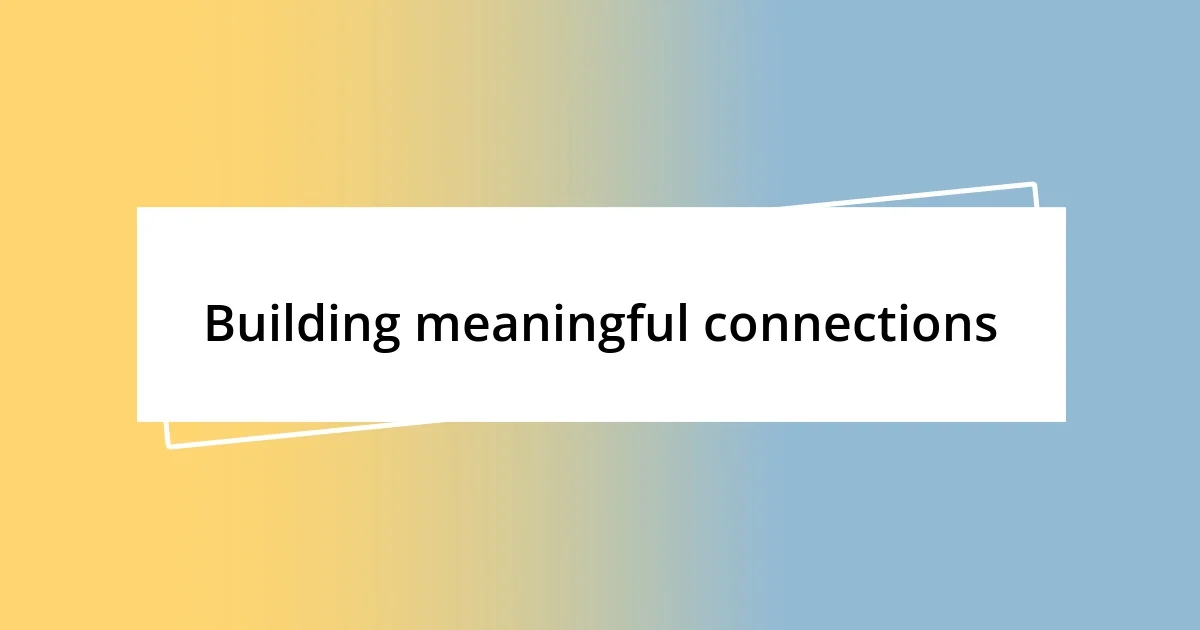
Building meaningful connections
Building meaningful connections in the tech industry goes beyond mere casual introductions; it’s about fostering genuine relationships. I recall attending a conference where I met a seasoned developer over coffee. We discussed our projects and shared our career aspirations. That conversation didn’t just end with handshakes; it sparked an ongoing mentoring relationship that has profoundly influenced my skills and outlook.
As I navigate this industry, I’ve learned that authenticity can significantly enhance how we connect with others. One time, I attended a networking event, feeling nervous about the crowd. Instead of sticking to small talk, I decided to open up about my challenges with a recent project. To my surprise, several people chimed in with their own stories and advice. It turned the night into a meaningful exchange rather than a superficial interaction.
A key part of building these connections is the follow-up. I’ve often found that a simple thank-you note or a message on LinkedIn after an initial meeting can lay the groundwork for a lasting relationship. It’s like planting a seed; you nurture it with attentiveness and engagement, and it grows into a strong network of support and collaboration.
| Type of Connection | Characteristics |
|---|---|
| Superficial | Brief interactions, lack of depth, often forgettable |
| Meaningful | Genuine interest, offers of support, ongoing communication |
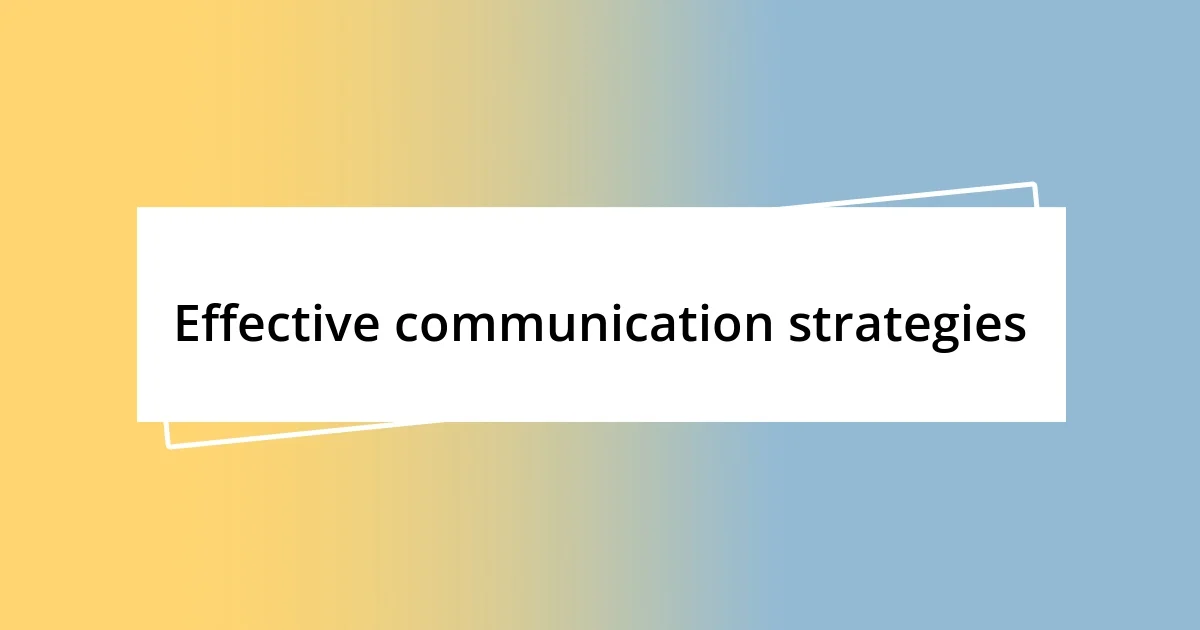
Effective communication strategies
Effective communication is the backbone of successful networking. In my experience, listening is just as crucial as speaking. I remember a time at a tech panel where I deliberately shifted my focus to truly hear what the speakers were saying rather than just waiting for my turn to contribute. This not only deepened my understanding of the topic but also allowed me to ask insightful questions that resonated with the audience, making me stand out in a sea of attendees.
Here are some strategies that have worked for me:
- Ask Open-Ended Questions: This invites deeper conversation and shows genuine interest in others’ experiences.
- Practice Empathy: Recognizing others’ emotions can create a smoother dialogue and ease communication barriers.
- Be Mindful of Non-Verbal Cues: Body language, eye contact, and tone all play a critical role in how your message is received.
- Share Personal Stories: Relate anecdotes that highlight your journey; this fosters connection and may inspire others to share theirs.
In another instance, I was in a small group discussion where I chose to be candid about my struggles with imposter syndrome. The moment I laid my vulnerability on the table, the atmosphere shifted. Others began to share their own fears and setbacks. It became a powerful moment of collective support, emphasizing that effective communication isn’t just about exchanging information; it’s about forging authentic human connections through shared experiences and emotions.
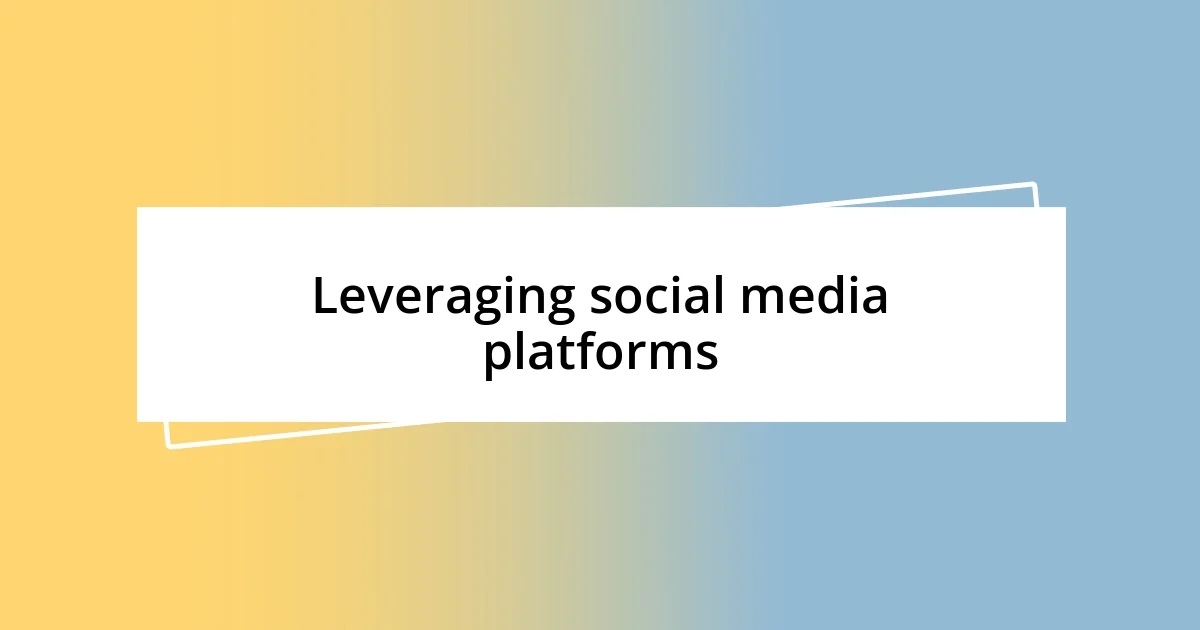
Leveraging social media platforms
Leveraging social media platforms can truly amplify your networking efforts. I remember when I first began using Twitter to connect with fellow tech enthusiasts. By sharing my thoughts on industry trends and engaging with others’ posts, I inadvertently started conversations that led to friendships and professional opportunities. It made me realize that social media isn’t just a broadcasting tool; it’s a collaborative space where real connections can flourish.
LinkedIn has also been a game-changer for me. One time, I reached out to an industry leader whose article resonated with me. Instead of just sending a standard connection request, I took the time to send a personalized message explaining what I appreciated about their work. This simple gesture opened the door to an insightful conversation that eventually led to mentorship. How often do we underestimate the power of a thoughtful message?
Instagram, surprisingly, has also facilitated connections in this sphere. I’ve shared snapshots from tech events and behind-the-scenes moments. People reached out to discuss not just the tech, but my perspective on the experience. It became a reminder that visual storytelling can inspire dialogue and deepen relationships. In the end, each social media platform has its unique strengths; it’s about understanding how to use them to foster authentic interactions.
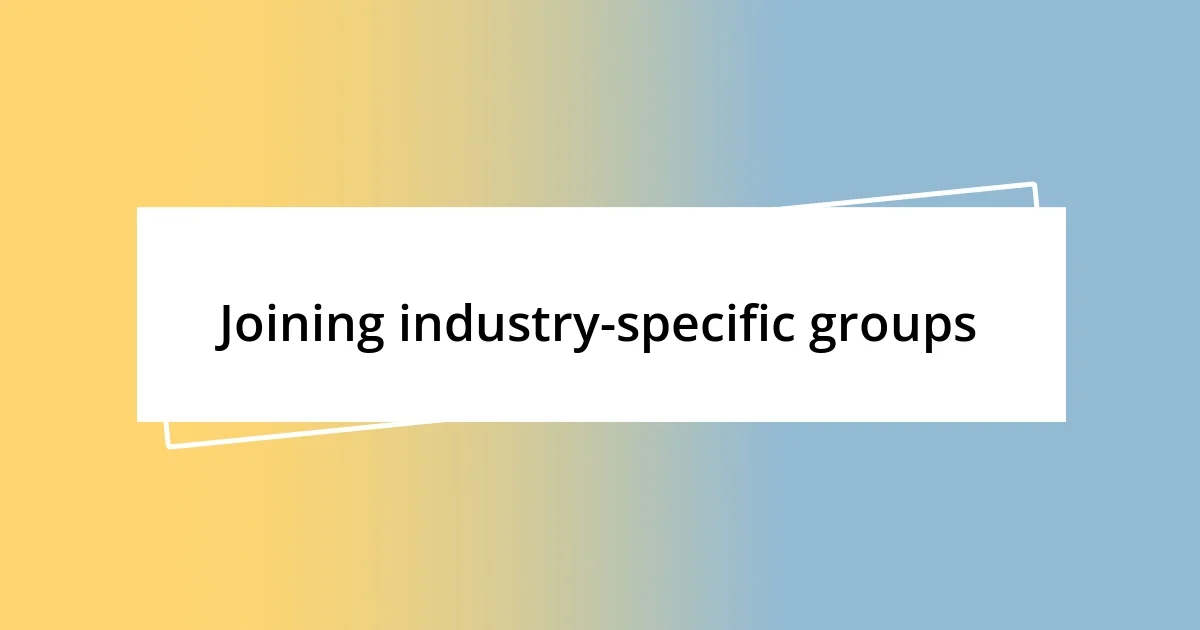
Joining industry-specific groups
Joining industry-specific groups has been one of the most rewarding decisions in my professional journey. I remember the first time I stumbled upon a local tech meetup. Initially, I hesitated, wondering what I could possibly contribute to a group filled with seasoned professionals. But once I stepped inside, it felt like being welcomed into a community—everyone was eager to share knowledge and experiences. That moment taught me the incredible value of surrounding myself with peers who share similar aspirations and interests.
Participating in these groups often leads to unexpected opportunities. During one session, I presented a project I had been working on. Surprisingly, someone from the group offered to connect me with resources that helped elevate my project. This experience underscored how much can come from simply showing up and being open to collaboration. What’s more, the friendships I formed opened my eyes to diverse perspectives, which fueled my creativity and problem-solving skills in ways I hadn’t anticipated.
I find that joining these industry-specific groups isn’t just about professional growth; it’s about personal development too. Sharing struggles and victories with like-minded individuals creates a supportive environment that allows vulnerability and growth. Have you ever felt the exhilarating rush of realizing you’re not alone in your challenges? I distinctly remember the relief I felt when I realized that others were navigating similar hurdles. That shared connection transformed my approach to challenges, shifting them from isolating experiences to opportunities for collective learning and camaraderie.
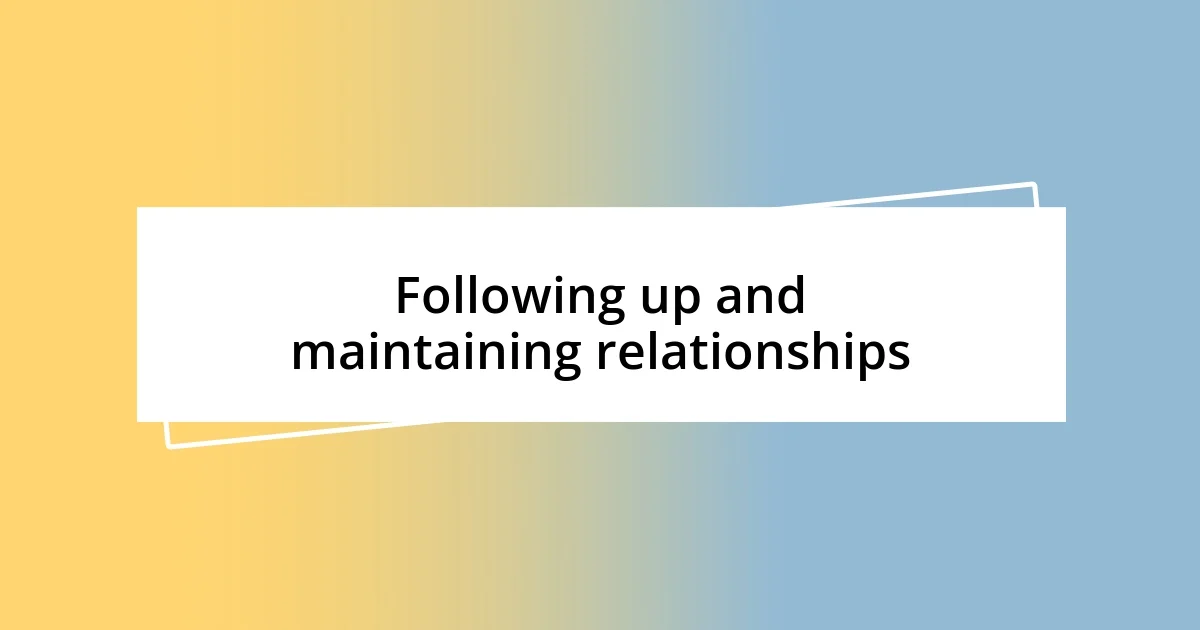
Following up and maintaining relationships
Following up after meeting someone is crucial to transforming a simple introduction into a lasting connection. I learned this the hard way after mistakenly letting contact slip through my fingers after a conference. One of my most interesting meetings was with a software developer who had shared some groundbreaking ideas. I sent a quick thank-you email, but I didn’t follow up further. Over time, I regretted not nurturing that initial spark, and I realized the value of investing time in these relationships. Reflecting on that, I now prioritize timely follow-ups.
Maintaining relationships in the tech industry often requires intentionality. I remember making it a habit to check in with a few key contacts at least once a month. I’d share articles that might interest them or ask for their thoughts on a recent trend. It was eye-opening to see how a simple message could reignite a conversation or even lead to collaborative projects. Have you ever wondered how a small gesture can lead to bigger opportunities? For me, these interactions fostered deeper trust and opened doors I never saw coming.
In my experience, relationships thrive on authenticity. During a casual catch-up with a former colleague, I felt comfortable sharing my career struggles. To my surprise, they did the same. It was a moment filled with empathy and understanding, reinforcing our bond. That experience taught me that being vulnerable creates a space for genuine connection. Just think about it—how often do we miss out on genuine relationships because we hold back? Embracing these honest conversations has enriched my network and transformed the way I view professional relationships.
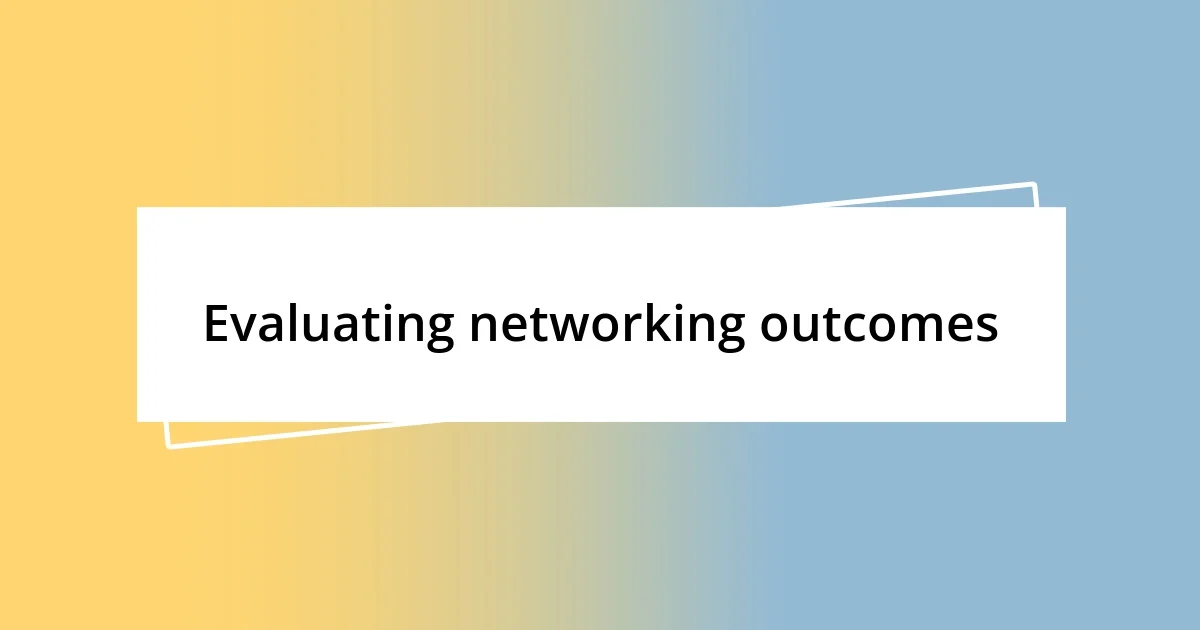
Evaluating networking outcomes
Evaluating the outcomes of networking can sometimes feel like an exercise in introspection. I can still recall a particular event where I connected with a product manager. After weeks of reflecting on our conversation, I realized that it wasn’t just the details they shared about their project that resonated with me; it was the way they navigated challenges. I took a mental note of their approach, which has since influenced my own problem-solving strategies. Have you ever left a conversation and thought deeply about how the insights could apply to your work?
As I started assessing my networking experiences, I focused on tangible outcomes. I remember attending a workshop where I met someone who eventually became my mentor. Through regular check-ins and discussions, they provided guidance that shaped my career trajectory. By comparing where I was before networking to where I am now, the growth has been undeniably evident. How can you not feel a sense of accomplishment when the connections lead to opportunities you once only dreamt of?
Whether it’s landing a new job, obtaining valuable advice, or even forming a collaborative partnership, I’ve found that the impact of networking can be profound. There was a time when I leveraged a connection from a networking event to secure a speaking engagement. The thrill of standing in front of an audience, sharing my knowledge, was a direct reflection of nurturing that relationship. Isn’t it fascinating how one moment of connection can set off a ripple of opportunities? Evaluating these outcomes continually motivates me to engage actively in the networking process, ensuring I harness every chance to grow both personally and professionally.










